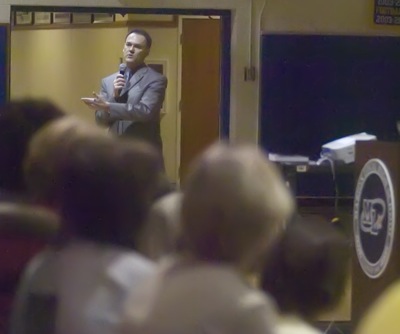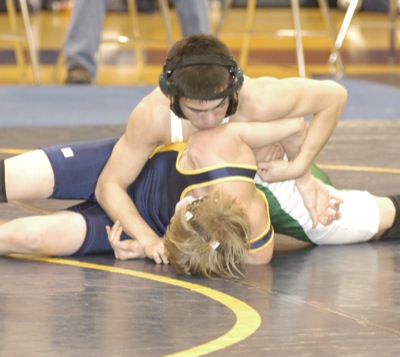Friday, February 1st, 2008
Marion Local officials tackle bullying policy
New rules affect school and adjacent property
By Margie Wuebker

Photo by Mark Pummell/The Daily Standard
Marion Local Superintendent Carl Metzger talks to staff members about the district's recently adopted hazing and bullying policy. The presentation was part of an inservice program held Wednesday morning at the high school auditorium.
MARIA STEIN - Nearly 100 Marion Local School District employees took part in a Wednesday morning inservice program outlining the recently adopted hazing and bullying policy.
Superintendent Carl Metzger told teachers, secretaries, cooks, coaches, bus drivers and maintenance personnel all Ohio school districts are required to have such a policy on how to deal with hazing and bullying incidents in place. Other local school districts, that do not have a specific bullying policy in place, will soon be adopting one, as well.
While Marion Local already had the basics in place, the board of education adopted a more in-depth version covering all aspects from definitions to the filing of a complaint to resolution.
"We decided to explain the specifics to the entire staff to make sure everyone is on the same page," Metzger said prior to the Power Point presentation. "It always seems bullying and hazing occurs somewhere else but in today's world we can no longer ignore little things. Things we used to think of as fun are not fun."
The policy relates not only to school property but adjacent property, school-sponsored activities, in school publications, through the use of district-owned or -operated communication equipment like computers, on school-provided transportation or any official school bus stop.
In January, the superintendent presented to board president Charlie Otte the first semiannual report on the matter. It concluded there had been no verified reports of such activity since the start of classes in August.
"The key word is verified," Metzger said. "We may have bullying/hazing issues floating around but there are no verified reports these things occurred."
The policy defines hazing as "doing any act or coercing another, including the victim, to do any act of intimidation or harassment to any student or other organization that causes or creates a substantial risk of causing mental or physical harm to any person."
Bullying is defined as "an intentional written, verbal or physical act that a student has exhibited toward another particular student more than once." Such behavior causes both mental and physical harm to the victim and is sufficiently "severe, persistent or pervasive" that it creates an intimidating, threatening or abusive environment.
Metzger admitted identifying a hazing incident can be tricky particularly at the elementary level where students frequently call their peers dumb or stupid or at the middle school level where students shun others one day and become best buddies the next. He suggested making a note of such behavior and, if it happens again, taking the offending student aside and explaining his/her behavior is not condoned.
Prohibited behavior includes: physical violence and/or attacks; threats, taunts and intimidation through words and/or gestures; extortion, damage or stealing of money and/or possessions; exclusion from peer groups or spreading rumors; posting slurs on Web sites, social networking sites, blogs or personal online journals; sending abusive or threatening e-mails, Web site postings or comments and instant messages; using camera phones to take embarrassing photographs; using Web-based/online sources to circulate gossip and rumors; and excluding others from an online group by falsely reporting them to Internet service providers for inappropriate language.
Metzger admitted "cyber bullying" is tough to control since many students have access to home computers. However, the school will take action if it occurs on district-owned computers. The district already has a policy prohibiting the use of cell phones in school and on buses.
Staff members witnessing hazing and bullying incidents must promptly notify the building principal or an appointed designee and then file a formal written report. Student or parent reports are to be handled in similar fashion within the next school day.
Students who make informal complaints may request anonymity with the reports taken, investigated and handled appropriately.
"We do not divulge names but what are the chances of a name getting out in the Marion Local district?" Metzger said. "Most kids won't come forward - they will write an anonymous letter or make an anonymous phone call."
There are different intervention methods depending on the seriousness of the situation. They include counseling and in- or out-of-school suspension. Expulsion, which must be preceded by a hearing, is reserved for serious incidents and/or when previous intervention has failed to solve the problem.
"Be proactive," Metzger said. "Stop behaviors and conduct even before they meet the formal definition of hazing and bullying. Students need to know what's acceptable and what's not. Students should respect each other and their teachers."


